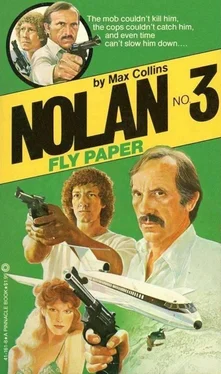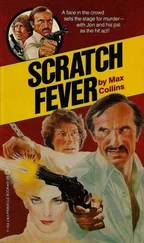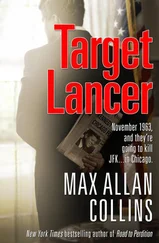Max Collins - Fly Paper
Здесь есть возможность читать онлайн «Max Collins - Fly Paper» весь текст электронной книги совершенно бесплатно (целиком полную версию без сокращений). В некоторых случаях можно слушать аудио, скачать через торрент в формате fb2 и присутствует краткое содержание. Город: New York, Год выпуска: 1981, Издательство: Pinnacle Books, Жанр: Криминальный детектив, на английском языке. Описание произведения, (предисловие) а так же отзывы посетителей доступны на портале библиотеки ЛибКат.
- Название:Fly Paper
- Автор:
- Издательство:Pinnacle Books
- Жанр:
- Год:1981
- Город:New York
- ISBN:нет данных
- Рейтинг книги:4 / 5. Голосов: 1
-
Избранное:Добавить в избранное
- Отзывы:
-
Ваша оценка:
- 80
- 1
- 2
- 3
- 4
- 5
Fly Paper: краткое содержание, описание и аннотация
Предлагаем к чтению аннотацию, описание, краткое содержание или предисловие (зависит от того, что написал сам автор книги «Fly Paper»). Если вы не нашли необходимую информацию о книге — напишите в комментариях, мы постараемся отыскать её.
Fly Paper — читать онлайн бесплатно полную книгу (весь текст) целиком
Ниже представлен текст книги, разбитый по страницам. Система сохранения места последней прочитанной страницы, позволяет с удобством читать онлайн бесплатно книгу «Fly Paper», без необходимости каждый раз заново искать на чём Вы остановились. Поставьте закладку, и сможете в любой момент перейти на страницу, на которой закончили чтение.
Интервал:
Закладка:
She’d seen the public’s reaction turn from amusement and titillation to terror and rage. Early on, the skyjackings (usually to Cuba) seemed a free vacation of sorts; even Time magazine urged skyjacked passengers to “enjoy the experience,” and “make the most of your side trip by doing a little shopping,” telling them of the “magnificent” Cuban beach, and noting that “the food is excellent, too.” Was it any wonder she’d overheard a passenger wistfully wishing for a skyjacking experience to brighten the boredom of a business trip? She’d winced as one federal aviation official had gone so far as to announce that skyjacking “sure takes the blahs out of air travel.”
And then violence had changed the amusement to terror: a pilot shot in the stomach by a skyjacker angry because the ransom money delivered to him was short of what he’d asked; a black militant beating crew members about the head with a revolver, threatening passengers with similar abuse; a prisoner being transported by plane finding a discarded razor in the john and, holding that razor to a flight attendant’s throat, demanding his own Cuban “side trip”; and, of course, the chaotic violence of the Arab-Israeli airline war, the world witnessing the destruction of a $23 million aircraft, a Pan Am 747 melted to junk by exploding dynamite charges.
With a feeling of disappointment verging on despair, Hazel and other flight attendants had watched as the FAA tried desperately to find means of fighting skyjacking, most of those means proving ineffective at best, ludicrous at worst. A bulletproof shield protecting the pilot was one FAA official’s suggestion, as well as barring the cockpit door. Just how this would dissuade a skyjacker, who’d have plenty of unprotected hostages aboard to choose from, was not explained, unless Hazel and her sisters were to wear bulletproof bras and issue bulletproof shields to each passenger. The FAA then distributed to ticket-sales personnel a “psychological profile” of the “typical” skyjacker, but skyjackers seemed able to get past ticket counters without hassle despite the “profile,” which was general to the point of silliness, anyway, the most solid “fact” being that “the average skyjacker is a man between sixteen and thirty-five years of age.” The FAA’s next move was to create a system of armed guards for planes, in response to a request heard repeatedly from the public, and the Sky Marshal Program was the result. This particular concept terrified Hazel from the start: the idea of a shoot-out at 30,000 feet was enough to terrify anybody. The “unwritten directive” of the sky marshal was well-known among flight attendants: “If a skyjacker uses a flight attendant as a hostage, shoot the flight attendant to reach the skyjacker.” Swell. In actual practice, however, the sky marshals were little threat to either skyjackers or flight attendants. Typical of their ineffectiveness was the successful skyjacking of a jumbo jet to Cuba, though three sky marshals were present on the plane, as well as an FBI agent. The Sky Marshal Program was discontinued some time ago, but the recent rash of skyjackings by Cuban refugees and other social outcasts had prompted the FAA to reinstate it. This Hazel saw as more of a gesture than an anti-skyjack measure.
The only way to effectively deal with a skyjacker was to stop him before he got on a plane. She remembered when the first real step was taken: the search of carry-on luggage before passengers boarded the plane. Suddenly guns and knives were commonly found dumped in waste cans in airport johns. Then metal detectors came into use, and X-ray of carry-on luggage, and skyjacking again became an exception, not a rule. Still, skyjackings had been pulled off by men using “guns” that turned out to be plastic ball-point pens and combs; one skyjacker proclaimed himself a human bomb, while his “explosives” turned out to be rolls of candy mints stripped to his body. The most hair-raising of the boomerang effects caused by the use of metal detectors was the switch skyjackers had made to nonmetallic devices such as homemade bombs. Hazel shuddered at the thought of that. Though neither situation exactly appealed to her, she would much prefer facing a man with a gun than a man with some unstable, patchwork homemade explosive device.
And now she was doing just that.
A young man of perhaps twenty years of age was aboard with what appeared to be a pocket calculator in his hand — claiming he was prepared to blow up the plane if his demands were not met.
JoAnne, the youngest of the other three attendants on board, had come to Hazel with a look of stark panic in her eyes. Hazel was in the galley section, which was between the first-class and tourist cabins, getting drinks ready. JoAnne said, “He says he wants to talk to the head stewardess. That’s you, Hazel.”
“Who says what?”
“A kid. He says he’s got a bomb. He wants to talk to you.”
“All right. Now, JoAnne. Listen to me. Keep your head on. Are you all right?”
“Yes.”
“Where is he? Up forward?”
“Yes.”
“Okay. Are you all right, JoAnne?”
“Yes.”
“Okay. You stay right here. Don’t say a word to anybody. I see him up there. Green corduroy shirt and jeans? With a beer belly?”
“Yes.”
“Okay, then. You stay here. You might finish getting these drinks ready for me.”
“Yes.”
He was just a boy, really. A kid. With damn freckles, yet. He was wearing mirror-type sunglasses, which she didn’t believe he’d been wearing when he came aboard, and he was wearing a wig. Why hadn’t she noticed that wig before? Damn.
“Are you the head stewardess?”
“I’m the senior flight attendant, yes.”
“Hazel?” he said, reading her name off the badge on her breast pocket. “Your name is Hazel?”
“Yes, it is.”
“Hazel, I have just now pressed some buttons that have armed a bomb that is on this plane, in my suitcase in the cargo hold of the plane. If my fingers touch this—” he indicated the black plastic calculator— “just so, the bomb will explode and all of us won’t be here anymore.”
“Do you want to see the captain?”
“Yes. You tell him to come out here.”
She entered the cockpit the greenish glow of the instrument panel brighter than the overcast sky out the forward windows.
Captain McIntire, a handsome gray-templed man in his early forties, a married man with two kids, and a confirmed letch who’d tried a hundred times to get in Hazel’s pants (unsuccessfully), turned in the left-hand seat and grinned wolfishly, saying, “How’s tricks, Hazel?”
Beside him, the copilot, Willis, suppressed a groan. He was a thin guy with a pockmarked complexion and short brown hair, in his late thirties. He hated McIntire, and it showed sometimes. Behind McIntire was the navigator, Reed, a balding, fleshy, middle-aged man with no discernible personality, as far as Hazel knew — an invisible man as gray as that sky out there.
Hazel did not play it cute. No, Captain, tricks are not good, she thought, and said, “We have a skyjacker aboard. He’s just outside the cockpit here.”
The three men traded expressions of disgust that masked fear.
McIntire cleared his throat, but his first words came out a squeak, anyway. “Send him in, damn it.”
“He wants you to come see him.”
Reed said, “Whoever heard of hijacking a plane out of Detroit?”
Willis said, “We did. Now.”
The captain turned over the controls to his co-pilot and rose from his seat. He wasn’t grinning anymore.
Hazel stood next to the captain while the boy told him about the bomb. He spoke in a voice that was soft and seemingly calm but had a faint tremor in it. Then he made his demands. He said, “Two hundred thousand dollars in cash. This is how I want it: ten thousand twenty-dollar bills. Radio ahead and have the cash delivered to the Quad City Airport at Mo-line. We will, naturally, fly directly to the Quad City Airport. Then we’ll fly somewhere else.”
Читать дальшеИнтервал:
Закладка:
Похожие книги на «Fly Paper»
Представляем Вашему вниманию похожие книги на «Fly Paper» списком для выбора. Мы отобрали схожую по названию и смыслу литературу в надежде предоставить читателям больше вариантов отыскать новые, интересные, ещё непрочитанные произведения.
Обсуждение, отзывы о книге «Fly Paper» и просто собственные мнения читателей. Оставьте ваши комментарии, напишите, что Вы думаете о произведении, его смысле или главных героях. Укажите что конкретно понравилось, а что нет, и почему Вы так считаете.












